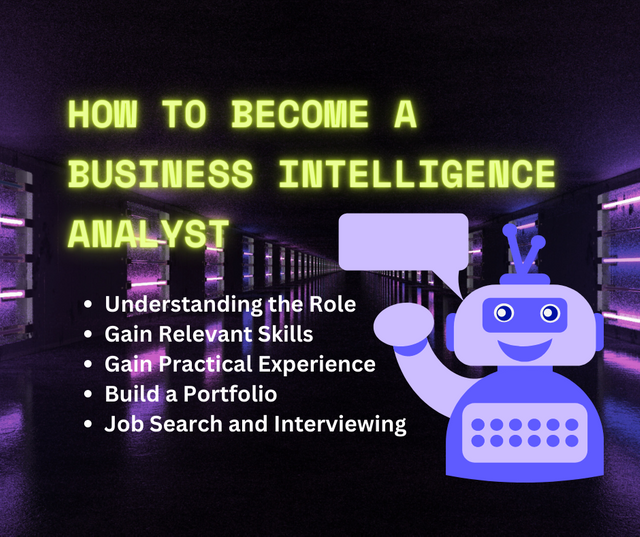In today's data-driven world, businesses rely on information to make informed decisions. Business Intelligence (BI) analysts play a pivotal role in transforming raw data into actionable insights. If you're intrigued by data analysis, have a knack for problem-solving, and want to bridge the gap between data and decision-making, a career as a Business Intelligence Analyst might be perfect for you. In this comprehensive guide, we'll walk you through the steps on how to become a Business Intelligence Analyst.

1. Understanding the Role
Before embarking on your journey to become a Business Intelligence Analyst, it's essential to understand the role thoroughly.
A. What Does a BI Analyst Do?
Business Intelligence Analysts are responsible for gathering and analyzing data to help organizations make informed decisions. They create dashboards, reports, and data visualizations, turning complex data into easily digestible information for non-technical stakeholders.
B. Skills Required
Analytical skills: BI analysts must be able to dissect data to identify trends, patterns, and anomalies.
Technical skills: Proficiency in tools like SQL, Excel, and data visualization tools (e.g., Tableau or Power BI) is crucial.
Communication skills: BI analysts need to convey complex data findings to non-technical teams effectively.
Business acumen: Understanding the organization's goals and industry trends is essential.
2. Educational Background
A. Choose Your Educational Path
Most BI analysts have at least a bachelor's degree in a related field such as:
• Computer Science
• Information Technology
• Mathematics
• Statistics
• Business Administration
However, many successful BI analysts come from diverse educational backgrounds. The key is to build a strong foundation in mathematics, statistics, and computer science.
B. Consider a Master's Degree
While not always necessary, a master's degree in fields like Business Analytics or Data Science can give you a competitive edge in the job market. Some positions, especially in larger organizations, may require or prefer candidates with advanced degrees.
3. Gain Relevant Skills
A. Learn Data Analysis Tools
Familiarize yourself with essential tools and technologies, including:
SQL: Learn to query and manipulate data in relational databases.
Excel: Master data analysis functions and pivot tables.
Data Visualization Tools: Explore tools like Tableau, Power BI, or Python libraries like Matplotlib and Seaborn for creating compelling data visualizations.
B. Programming Skills
Learning a programming language like Python or R is advantageous. These languages are widely used for data manipulation, analysis, and visualization.
C. Statistic and Machine Learning
Understand statistical concepts and machine learning algorithms. These skills will enable you to derive meaningful insights from data.
D. Business Knowledge
Develop a deep understanding of the industry in which you want to work. Knowledge of business processes and trends will help you provide more valuable insights.
4. Gain Practical Experience
A. Internships and Entry-Level Jobs
Start your career with internships or entry-level positions, such as data analyst or junior BI analyst. These roles offer hands-on experience and help you build a portfolio of work.
B. Personal Projects
Create personal data analysis projects to showcase your skills. This can include analyzing open datasets or solving real-world business problems.
C. Certifications
Consider earning certifications by enrolling in Business Intelligence Course such as:
• Microsoft Certified: Data Analyst Associate
• Google Data Analytics Professional Certificate
• Bootcamps
• Tableau Desktop Specialist
• Certifications can boost your credibility and skills
5. Build a Portfolio
A strong portfolio is essential to demonstrate your capabilities to potential employers. Include examples of data analysis projects, dashboards, and reports you've created.
6. Network and Stay Updated
A. Join Professional Organizations
Become a member of organizations like the Data Warehousing Institute (TDWI) or the Data & Marketing Association (DMA) to network with professionals in the field.
B. Attend Conferences and Webinars
Participate in industry events to stay updated on the latest trends and technologies in BI.
7. Job Search and Interviewing
A. Tailor Your Resume and Cover Letter
Highlight your relevant skills and experiences. Customize your application materials for each job application.
B. Prepare for Interviews
Be ready to answer technical questions and demonstrate your problem-solving abilities. Showcase your ability to translate data into actionable insights.
8. Career Growth
Once you land a BI analyst role, focus on continuous learning and skill development. Consider specializing in areas like data visualization, big data analytics, or machine learning to advance your career.
Conclusion
Becoming a Business Intelligence Analyst is an exciting and rewarding journey. It requires a strong educational foundation, technical skills, and a passion for turning data into valuable insights. By following the steps outlined in this guide, you can embark on a successful career in the dynamic field of Business Intelligence. Remember, learning is a continuous process, and staying updated with industry trends is key to long-term success in this role. Good luck on your path to becoming a BI analyst!